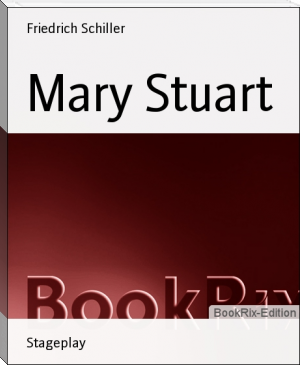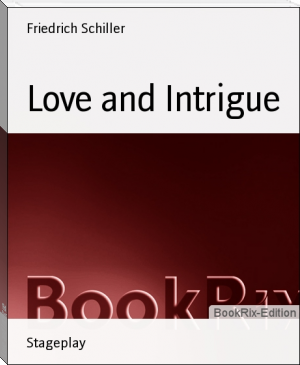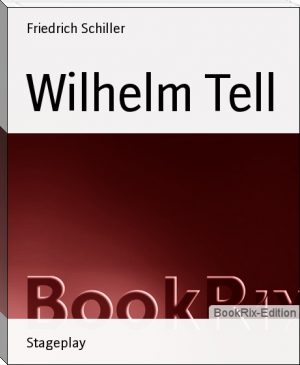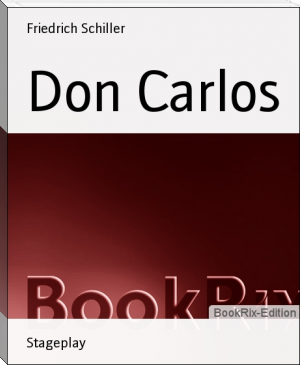Mary Stuart, Friedrich Schiller [the chimp paradox txt] 📗

- Author: Friedrich Schiller
Book online «Mary Stuart, Friedrich Schiller [the chimp paradox txt] 📗». Author Friedrich Schiller
shame,
Lay my crowned head upon the fatal block?
MORTIMER.
She will most surely dare it, doubt it not.
MARY.
And can she thus roll in the very dust
Her own, and every monarch's majesty?
MORTIMER.
She thinks on nothing now but present danger,
Nor looks to that which is so far removed.
MARY.
And fears she not the dread revenge of France?
MORTIMER.
With France she makes an everlasting peace;
And gives to Anjou's duke her throne and hand.
MARY.
Will not the King of Spain rise up in arms?
MORTIMER.
She fears not a collected world in arms?
If with her people she remains at peace.
MARY.
Were this a spectacle for British eyes?
MORTIMER.
This land, my queen, has, in these latter days,
Seen many a royal woman from the throne
Descend and mount the scaffold: - her own mother
And Catherine Howard trod this fatal path;
And was not Lady Grey a crowned head?
MARY (after a pause).
No, Mortimer, vain fears have blinded you;
'Tis but the honest care of your true heart,
Which conjures up these empty apprehensions.
It is not, sir, the scaffold that I fear:
There are so many still and secret means
By which her majesty of England may
Set all my claims to rest. Oh, trust me, ere
An executioner is found for me,
Assassins will be hired to do their work.
'Tis that which makes me tremble, Mortimer:
I never lift the goblet to my lips
Without an inward shuddering, lest the draught
May have been mingled by my sister's love.
MORTIMER.
No: - neither open or disguised murder
Shall e'er prevail against you: - fear no more;
All is prepared; - twelve nobles of the land
Are my confederates, and have pledged to-day,
Upon the sacrament, their faith to free you,
With dauntless arm, from this captivity.
Count Aubespine, the French ambassador,
Knows of our plot, and offers his assistance:
'Tis in his palace that we hold our meetings.
NARY.
You make me tremble, sir, but not for joy!
An evil boding penetrates my heart.
Know you, then, what you risk? Are you not scared
By Babington and Tichburn's bloody heads,
Set up as warnings upon London's bridge?
Nor by the ruin of those many victims
Who have, in such attempts, found certain death,
And only made my chains the heavier?
Fly hence, deluded, most unhappy youth!
Fly, if there yet be time for you, before
That crafty spy, Lord Burleigh, track your schemes,
And mix his traitors in your secret plots.
Fly hence: - as yet, success hath never smiled
On Mary Stuart's champions.
MORTIMER.
I am not scared
By Babington and Tichburn's bloody heads
Set up as warnings upon London's bridge;
Nor by the ruin of those many victims
Who have, in such attempts, found certain death:
They also found therein immortal honor,
And death, in rescuing you, is dearest bliss.
MARY.
It is in vain: nor force nor guile can save me: -
My enemies are watchful, and the power
Is in their hands. It is not Paulet only
And his dependent host; all England guards
My prison gates: Elizabeth's free will
Alone can open them.
MORTIMER.
Expect not that.
MARY.
One man alone on earth can open them.
MORTIMER.
Oh, let me know his name!
MARY.
Lord Leicester.
MORTIMER.
He!
[Starts back in wonder.
The Earl of Leicester! Your most bloody foe,
The favorite of Elizabeth! through him - -
MARY.
If I am to be saved at all, 'twill be
Through him, and him alone. Go to him, sir;
Freely confide in him: and, as a proof
You come from me, present this paper to him.
[She takes a paper from her bosom; MORTIMER draws back,
and hesitates to take it.
It doth contain my portrait: - take it, sir;
I've borne it long about me; but your uncle's
Close watchfulness has cut me off from all
Communication with him; - you were sent
By my good angel.
[He takes it.
MORTIMER.
Oh, my queen! Explain
This mystery.
MARY.
Lord Leicester will resolve it.
Confide in him, and he'll confide in you.
Who comes?
KENNEDY (entering hastily).
'Tis Paulet; and he brings with him
A nobleman from court.
MORTIMER.
It is Lord Burleigh.
Collect yourself, my queen, and strive to hear
The news he brings with equanimity.
[He retires through a side door, and KENNEDY follows him.
SCENE VII.
Enter LORD BURLEIGH, and PAULET.
PAULET (to MARY).
You wished to-day assurance of your fate;
My Lord of Burleigh brings it to you now;
Hear it with resignation, as beseems you.
MARY.
I hope with dignity, as it becomes
My innocence, and my exalted station.
BURLEIGH.
I come deputed from the court of justice.
MARY.
Lord Burleigh lends that court his willing tongue,
Which was already guided by his spirit.
PAULET.
You speak as if no stranger to the sentence.
MARY.
Lord Burleigh brings it; therefore do I know it.
PAULET.
[It would become you better, Lady Stuart,
To listen less to hatred.
MARY.
I but name
My enemy: I said not that I hate him.]
But to the matter, sir.
BURLEIGH.
You have acknowledged
The jurisdiction of the two-and-forty.
MARY.
My lord, excuse me, if I am obliged
So soon to interrupt you. I acknowledged,
Say you, the competence of the commission?
I never have acknowledged it, my lord;
How could I so? I could not give away
My own prerogative, the intrusted rights
Of my own people, the inheritance
Of my own son, and every monarch's honor
[The very laws of England say I could not.]
It is enacted by the English laws
That every one who stands arraigned of crime
Shall plead before a jury of his equals:
Who is my equal in this high commission?
Kings only are my peers.
BURLEIGH.
But yet you heard
The points of accusation, answered them
Before the court - -
MARY.
'Tis true, I was deceived
By Hatton's crafty counsel: - he advised me,
For my own honor, and in confidence
In my good cause, and my most strong defence,
To listen to the points of accusation,
And prove their falsehoods. This, my lord, I did
From personal respect for the lords' names,
Not their usurped charge, which I disclaim.
BURLEIGH.
Acknowledge you the court, or not, that is
Only a point of mere formality,
Which cannot here arrest the course of justice.
You breathe the air of England; you enjoy
The law's protection, and its benefits;
You therefore are its subject.
MARY.
Sir, I breathe
The air within an English prison walls:
Is that to live in England; to enjoy
Protection from its laws? I scarcely know
And never have I pledged my faith to keep them.
I am no member of this realm; I am
An independent, and a foreign queen.
BURLEIGH.
And do you think that the mere name of queen
Can serve you as a charter to foment
In other countries, with impunity,
This bloody discord? Where would be the state's
Security, if the stern sword of justice
Could not as freely smite the guilty brow
Of the imperial stranger as the beggar's?
MARY.
I do not wish to be exempt from judgment,
It is the judges only I disclaim.
BURLEIGH.
The judges? How now, madam? Are they then
Base wretches, snatched at hazard from the crowd?
Vile wranglers that make sale of truth and justice;
Oppression's willing hirelings, and its tools?
Are they not all the foremost of this land,
Too independent to be else than honest,
And too exalted not to soar above
The fear of kings, or base servility?
Are they not those who rule a generous people
In liberty and justice; men, whose names
I need but mention to dispel each doubt,
Each mean suspicion which is raised against them?
Stands not the reverend primate at their head,
The pious shepherd of his faithful people,
The learned Talbot, keeper of the seals,
And Howard, who commands our conquering fleets?
Say, then, could England's sovereign do more
Than, out of all the monarchy, elect
The very noblest, and appoint them judges
In this great suit? And were it probable
That party hatred could corrupt one heart;
Can forty chosen men unite to speak
A sentence just as passion gives command?
MARY (after a short pause).
I am struck dumb by that tongue's eloquence,
Which ever was so ominous to me.
And how shall I, a weak, untutored woman,
Cope with so subtle, learned an orator?
Yes truly; were these lords as you describe them,
I must be mute; my cause were lost indeed,
Beyond all hope, if they pronounce me guilty.
But, sir, these names, which you are pleased to praise,
These very men, whose weight you think will crush me,
I see performing in the history
Of these dominions very different parts:
I see this high nobility of England,
This grave majestic senate of the realm,
Like to an eastern monarch's vilest slaves,
Flatter my uncle Henry's sultan fancies:
I see this noble, reverend House of Lords,
Venal alike with the corrupted Commons,
Make statutes and annul them, ratify
A marriage and dissolve it, as the voice
Of power commands: to-day it disinherits,
And brands the royal daughters of the realm
With the vile name of bastards, and to-morrow
Crowns them as queens, and leads them to the throne.
I see them in four reigns, with pliant conscience,
Four times abjure their faith; renounce the pope
With Henry, yet retain the old belief;
Reform themselves with Edward; hear the mass
Again with Mary; with Elizabeth,
Who governs now, reform themselves again.
BURLEIGH.
You say you are not versed in England's laws,
You seem well read, methinks, in her disasters.
MARY.
And these men are my judges?
[As LORD BURLEIGH seems to wish to speak.
My lord treasurer,
Towards you I will be just, be you but just
To me. 'Tis said that you consult with zeal
The good of England, and of England's queen;
Are honest, watchful, indefatigable;
I will believe it. Not your private ends,
Your sovereign and your country's weal alone,
Inspire your counsels and direct your deeds.
Therefore, my noble lord, you should the more
Distrust your heart; should see that you mistake not
The welfare of the government for justice.
I do not doubt, besides yourself, there are
Among my judges many upright men:
But they are Protestants, are eager all
For England's quiet,
Lay my crowned head upon the fatal block?
MORTIMER.
She will most surely dare it, doubt it not.
MARY.
And can she thus roll in the very dust
Her own, and every monarch's majesty?
MORTIMER.
She thinks on nothing now but present danger,
Nor looks to that which is so far removed.
MARY.
And fears she not the dread revenge of France?
MORTIMER.
With France she makes an everlasting peace;
And gives to Anjou's duke her throne and hand.
MARY.
Will not the King of Spain rise up in arms?
MORTIMER.
She fears not a collected world in arms?
If with her people she remains at peace.
MARY.
Were this a spectacle for British eyes?
MORTIMER.
This land, my queen, has, in these latter days,
Seen many a royal woman from the throne
Descend and mount the scaffold: - her own mother
And Catherine Howard trod this fatal path;
And was not Lady Grey a crowned head?
MARY (after a pause).
No, Mortimer, vain fears have blinded you;
'Tis but the honest care of your true heart,
Which conjures up these empty apprehensions.
It is not, sir, the scaffold that I fear:
There are so many still and secret means
By which her majesty of England may
Set all my claims to rest. Oh, trust me, ere
An executioner is found for me,
Assassins will be hired to do their work.
'Tis that which makes me tremble, Mortimer:
I never lift the goblet to my lips
Without an inward shuddering, lest the draught
May have been mingled by my sister's love.
MORTIMER.
No: - neither open or disguised murder
Shall e'er prevail against you: - fear no more;
All is prepared; - twelve nobles of the land
Are my confederates, and have pledged to-day,
Upon the sacrament, their faith to free you,
With dauntless arm, from this captivity.
Count Aubespine, the French ambassador,
Knows of our plot, and offers his assistance:
'Tis in his palace that we hold our meetings.
NARY.
You make me tremble, sir, but not for joy!
An evil boding penetrates my heart.
Know you, then, what you risk? Are you not scared
By Babington and Tichburn's bloody heads,
Set up as warnings upon London's bridge?
Nor by the ruin of those many victims
Who have, in such attempts, found certain death,
And only made my chains the heavier?
Fly hence, deluded, most unhappy youth!
Fly, if there yet be time for you, before
That crafty spy, Lord Burleigh, track your schemes,
And mix his traitors in your secret plots.
Fly hence: - as yet, success hath never smiled
On Mary Stuart's champions.
MORTIMER.
I am not scared
By Babington and Tichburn's bloody heads
Set up as warnings upon London's bridge;
Nor by the ruin of those many victims
Who have, in such attempts, found certain death:
They also found therein immortal honor,
And death, in rescuing you, is dearest bliss.
MARY.
It is in vain: nor force nor guile can save me: -
My enemies are watchful, and the power
Is in their hands. It is not Paulet only
And his dependent host; all England guards
My prison gates: Elizabeth's free will
Alone can open them.
MORTIMER.
Expect not that.
MARY.
One man alone on earth can open them.
MORTIMER.
Oh, let me know his name!
MARY.
Lord Leicester.
MORTIMER.
He!
[Starts back in wonder.
The Earl of Leicester! Your most bloody foe,
The favorite of Elizabeth! through him - -
MARY.
If I am to be saved at all, 'twill be
Through him, and him alone. Go to him, sir;
Freely confide in him: and, as a proof
You come from me, present this paper to him.
[She takes a paper from her bosom; MORTIMER draws back,
and hesitates to take it.
It doth contain my portrait: - take it, sir;
I've borne it long about me; but your uncle's
Close watchfulness has cut me off from all
Communication with him; - you were sent
By my good angel.
[He takes it.
MORTIMER.
Oh, my queen! Explain
This mystery.
MARY.
Lord Leicester will resolve it.
Confide in him, and he'll confide in you.
Who comes?
KENNEDY (entering hastily).
'Tis Paulet; and he brings with him
A nobleman from court.
MORTIMER.
It is Lord Burleigh.
Collect yourself, my queen, and strive to hear
The news he brings with equanimity.
[He retires through a side door, and KENNEDY follows him.
SCENE VII.
Enter LORD BURLEIGH, and PAULET.
PAULET (to MARY).
You wished to-day assurance of your fate;
My Lord of Burleigh brings it to you now;
Hear it with resignation, as beseems you.
MARY.
I hope with dignity, as it becomes
My innocence, and my exalted station.
BURLEIGH.
I come deputed from the court of justice.
MARY.
Lord Burleigh lends that court his willing tongue,
Which was already guided by his spirit.
PAULET.
You speak as if no stranger to the sentence.
MARY.
Lord Burleigh brings it; therefore do I know it.
PAULET.
[It would become you better, Lady Stuart,
To listen less to hatred.
MARY.
I but name
My enemy: I said not that I hate him.]
But to the matter, sir.
BURLEIGH.
You have acknowledged
The jurisdiction of the two-and-forty.
MARY.
My lord, excuse me, if I am obliged
So soon to interrupt you. I acknowledged,
Say you, the competence of the commission?
I never have acknowledged it, my lord;
How could I so? I could not give away
My own prerogative, the intrusted rights
Of my own people, the inheritance
Of my own son, and every monarch's honor
[The very laws of England say I could not.]
It is enacted by the English laws
That every one who stands arraigned of crime
Shall plead before a jury of his equals:
Who is my equal in this high commission?
Kings only are my peers.
BURLEIGH.
But yet you heard
The points of accusation, answered them
Before the court - -
MARY.
'Tis true, I was deceived
By Hatton's crafty counsel: - he advised me,
For my own honor, and in confidence
In my good cause, and my most strong defence,
To listen to the points of accusation,
And prove their falsehoods. This, my lord, I did
From personal respect for the lords' names,
Not their usurped charge, which I disclaim.
BURLEIGH.
Acknowledge you the court, or not, that is
Only a point of mere formality,
Which cannot here arrest the course of justice.
You breathe the air of England; you enjoy
The law's protection, and its benefits;
You therefore are its subject.
MARY.
Sir, I breathe
The air within an English prison walls:
Is that to live in England; to enjoy
Protection from its laws? I scarcely know
And never have I pledged my faith to keep them.
I am no member of this realm; I am
An independent, and a foreign queen.
BURLEIGH.
And do you think that the mere name of queen
Can serve you as a charter to foment
In other countries, with impunity,
This bloody discord? Where would be the state's
Security, if the stern sword of justice
Could not as freely smite the guilty brow
Of the imperial stranger as the beggar's?
MARY.
I do not wish to be exempt from judgment,
It is the judges only I disclaim.
BURLEIGH.
The judges? How now, madam? Are they then
Base wretches, snatched at hazard from the crowd?
Vile wranglers that make sale of truth and justice;
Oppression's willing hirelings, and its tools?
Are they not all the foremost of this land,
Too independent to be else than honest,
And too exalted not to soar above
The fear of kings, or base servility?
Are they not those who rule a generous people
In liberty and justice; men, whose names
I need but mention to dispel each doubt,
Each mean suspicion which is raised against them?
Stands not the reverend primate at their head,
The pious shepherd of his faithful people,
The learned Talbot, keeper of the seals,
And Howard, who commands our conquering fleets?
Say, then, could England's sovereign do more
Than, out of all the monarchy, elect
The very noblest, and appoint them judges
In this great suit? And were it probable
That party hatred could corrupt one heart;
Can forty chosen men unite to speak
A sentence just as passion gives command?
MARY (after a short pause).
I am struck dumb by that tongue's eloquence,
Which ever was so ominous to me.
And how shall I, a weak, untutored woman,
Cope with so subtle, learned an orator?
Yes truly; were these lords as you describe them,
I must be mute; my cause were lost indeed,
Beyond all hope, if they pronounce me guilty.
But, sir, these names, which you are pleased to praise,
These very men, whose weight you think will crush me,
I see performing in the history
Of these dominions very different parts:
I see this high nobility of England,
This grave majestic senate of the realm,
Like to an eastern monarch's vilest slaves,
Flatter my uncle Henry's sultan fancies:
I see this noble, reverend House of Lords,
Venal alike with the corrupted Commons,
Make statutes and annul them, ratify
A marriage and dissolve it, as the voice
Of power commands: to-day it disinherits,
And brands the royal daughters of the realm
With the vile name of bastards, and to-morrow
Crowns them as queens, and leads them to the throne.
I see them in four reigns, with pliant conscience,
Four times abjure their faith; renounce the pope
With Henry, yet retain the old belief;
Reform themselves with Edward; hear the mass
Again with Mary; with Elizabeth,
Who governs now, reform themselves again.
BURLEIGH.
You say you are not versed in England's laws,
You seem well read, methinks, in her disasters.
MARY.
And these men are my judges?
[As LORD BURLEIGH seems to wish to speak.
My lord treasurer,
Towards you I will be just, be you but just
To me. 'Tis said that you consult with zeal
The good of England, and of England's queen;
Are honest, watchful, indefatigable;
I will believe it. Not your private ends,
Your sovereign and your country's weal alone,
Inspire your counsels and direct your deeds.
Therefore, my noble lord, you should the more
Distrust your heart; should see that you mistake not
The welfare of the government for justice.
I do not doubt, besides yourself, there are
Among my judges many upright men:
But they are Protestants, are eager all
For England's quiet,
Free e-book «Mary Stuart, Friedrich Schiller [the chimp paradox txt] 📗» - read online now
Similar e-books:





Comments (0)